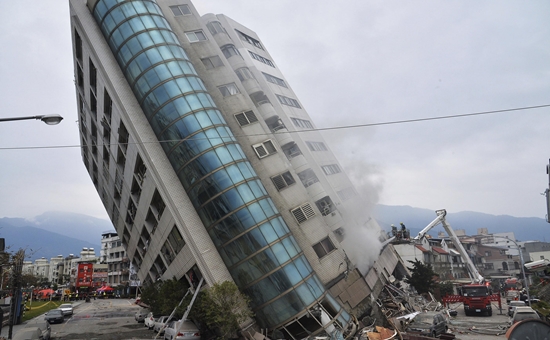
At least the lines of communication are open.
Around the time that the Chinese Dictator Xi Jinping and the American President Joe Biden were talking, by phone, for the first time since the travesty of their November 2023 meeting in San Francisco, Taiwan was being hit with an earthquake of 7.2 or 7.4 magnitude and China was continuing to militarily bully Taiwan in the Taiwan Strait.
The April 2, 2024 phone call confirms that diplomatic relations between the two countries have resumed, including at the very highest level, just as the two sides promised each other in San Francisco.
But we shouldn’t expect China’s wolf warrior diplomacy to now fade into pushiness-free politesse. China is still out to get everybody.
Natural and man-made
One sign that the Xi-led Chinese state still couldn’t care less about improving its conduct in order to improve its relations with the U.S. or anybody else is the way it continues to harass Taiwan, a country that China pretends is not a country and that China has long wanted to gobble up.
At least nine people died and some thousand or more were injured by the April 2 quake, the strongest to hit Taiwan in a quarter century.
USA Today reports: “Some buildings tumbled or were left leaning precariously while scores of people were trapped inside the damaged structures. An additional 70 people were trapped in a mine in Heping, northwest of Hualien. Hundreds of thousands of terrified residents lost power as landslides rolled across highways. The temblor set off a tsunami warning for southern Japan and the Philippines that was later lifted.”
Cut to: “coordinated display of military force by the People’s Liberation Army around Taiwan,” coming right after the Biden–Xi phone call. Perhaps Xi had even instructed his commanders to wait until he could hang up on Biden. Fox News:
At least 30 planes and nine ships were detected in Taiwan’s air defense identification zone (ADIZ) by the country’s Ministry of National Defense (MND).
“30 PLA aircraft and 9 PLAN vessels operating around Taiwan were detected up until 6 a.m. (UTC+8) today. 20 of the aircraft entered Taiwan’s northern, middle line, and SW ADIZ,” the Taiwanese MND announced via social media [Twitter]. “[Republic of China Armed Forces] have monitored the situation and employed appropriate force to respond.”
“The Republic of China” is the official name of Taiwan….
Instead of being deterred by the earthquake, China may well have regarded it as fortuitously enhancing the war game. If you’re invading a country, it is a stroke of luck if the defenders of the country you’re invading must simultaneously contend with some other massive kind of assault. If you’re only practice-invading, that a big earthquake is also clobbering your target doesn’t provide the same benefit, obviously; but it can’t hurt if you’re a prospective conqueror trying to gauge the effects of all contingencies.
Half-betrayed
In Taiwanese newscasts, China’s growling and rumbling in the Strait is just another routine story. There’s an earthquake, China continues to menace Taiwan, a former president of Taiwan continues to recommend appeasing the mainland government as the only way to avoid war, the incoming president of Taiwan visits a secret military base, advanced technology helps young Taiwanese baseball players to improve their swing. Etc.
If, despite decades of threats, China has yet to invade and conquer Taiwan, some credit must go to the fact that the United States government only half-betrayed Taiwan a half-century ago.
On April 10, 1979, the U.S. enacted the Taiwan Relations Act, the purpose of which was in large part to “to promote the foreign policy of the United States by authorizing the continuation of commercial, cultural, and other relations between the people of the United States and the people on Taiwan….”
The Act cites the termination of formal U.S. relations with Taiwan as its reason for being and states that it is
the policy of the United States to preserve and promote extensive, close, and friendly commercial, cultural, and other relations between the people of the United States and the people on Taiwan, as well as the people on the China mainland and all other peoples of the Western Pacific area; to declare that peace and stability in the area are in the political, security, and economic interests of the United States, and are matters of international concern;…to consider any effort to determine the future of Taiwan by other than peaceful means, including by boycotts or embargoes, a threat to the peace and security of the Western Pacific area and of grave concern to the United States; to provide Taiwan with arms of a defensive character….
In short: “Despite Kissinger, Nixon, and Carter, we won’t leave you in the lurch, Taiwan.” All these years, the United States has continued to withhold the sanction of formal recognition and most formal level of relations that it long ago withdrew. But U.S. arms sales to Taiwan and U.S. military presence have helped to deter China. Taiwan has survived.
To mark the forty-fifth anniversary of the Taiwan Relations Act, the Global Taiwan Institute has published several perspectives on its legacy. One of the questions being posed: “Is Biden True to the Congressional Script on Taiwan’s Self-Defense?”





